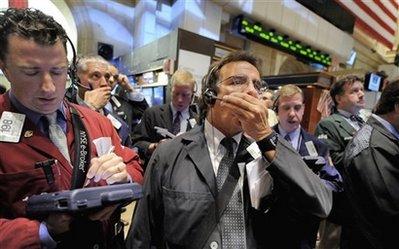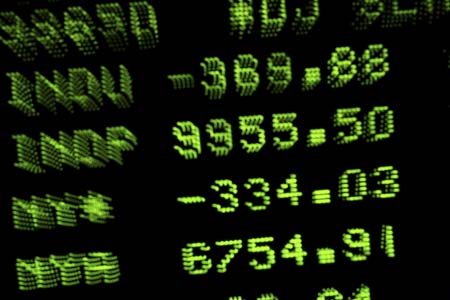NEW YORK - Wall Street joined in a worldwide cascade of despair Monday over the financial crisis, driving the Dow Jones industrials to their biggest loss ever during a trading day. Even a big afternoon rally failed to keep the Dow from its first close below 10,000 since 2004.
The sell-off came despite the $700 billion US government bailout package, which was signed into law Friday after two weeks in which traders had appeared to count on the rescue as their only hope to avoid a market meltdown.

Traders work on the New York Stock Exchange floor, Monday Oct. 6, 2008. Wall Street tumbled again Monday, joining a sell-off around the world as fears grew that the financial crisis will cascade through economies globally despite bailout efforts by the US and other governments. [Agencies] |
At its worst point, the Dow was down more than 800 points, an intraday record. The stock market rallied during the final 90 minutes of the trading day, and the Dow finished down about 370 points at 9,955.50.
The average is down almost 30 percent from its all-time high of 14,164.53, set a year ago Thursday.
Speculation among traders late in the session that the market's pullback had been severe enough to force the Federal Reserve into taking other steps to soothe the markets helped stocks rebound from their lows.

The final tally for the Dow Jones Industrial Average is seen on a board at the New York Stock Exchange, October 6, 2008. Stocks slid for a fourth straight day on Monday, leaving the Dow below 10,000 for the first time in four years, on fears the global economy was hurtling into recession despite government efforts to contain the fast-spreading financial crisis. [Agencies]
|
"If you can't say that we're oversold now I don't know what you say. You're at least due for a bounce if nothing else," said Bill Stone, chief investment strategist for PNC Wealth Management.
The global plunge in stocks was under way well before Wall Street ever woke up. In Japan, the Nikkei average lost more than 4 percent. And then the losses spread across Europe — nearly 6 percent for the FTSE-100 in Britain, 7 percent for the German DAX and more than 9 percent for France's CAC-40.
In the United States, President Bush twice made unscheduled remarks on the economy, saying in Cincinnati that the economy would be "just fine" but that the bailout package needed time to work.
The troubles that started with an overheated housing market in the US have infected financial markets around the world, making banks fearful of lending to other banks, let alone to businesses and consumers. That has led to worries that economies around the world might not only sputter but slide into reverse.
The crush of selling Monday came exactly one week after the Dow lost 778 points, its biggest closing loss in terms of points. On that day, the House voted down an earlier bailout package that had appeared to be a safe bet to pass.
The swings in the Dow on Monday also marked the beginning a fourth week of tumult in the markets. Triple-digit Dow swings have been commonplace since mid-September, when investment house Lehman Brothers went bankrupt and the government stepped in to bail out insurer American International Group.
But even with the bailout package firmly in place — a plan under which the federal government will buy bad mortgage-related assets off the books of banks — investors remain worried that banks are too fearful to lend and are cutting off air to the economy.
Over the weekend, governments across Europe rushed to prop up failing banks, while the governments of Germany, Ireland and Greece also said they would guarantee bank deposits. US investors appeared worried the bailout would not be enough to jump-start the economy. Even other steps, including a Federal Reserve decision to expand a loan program to squeezed banks, didn't help much.

